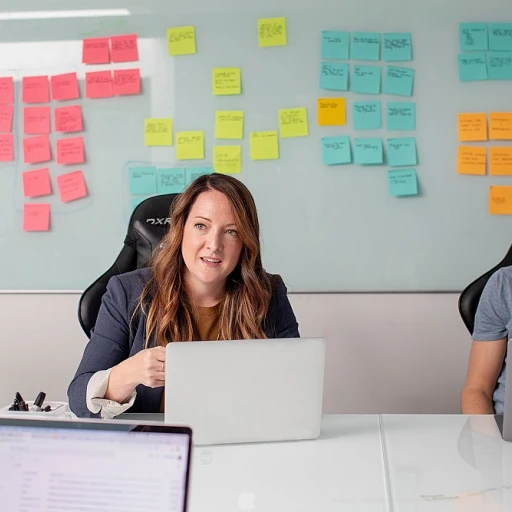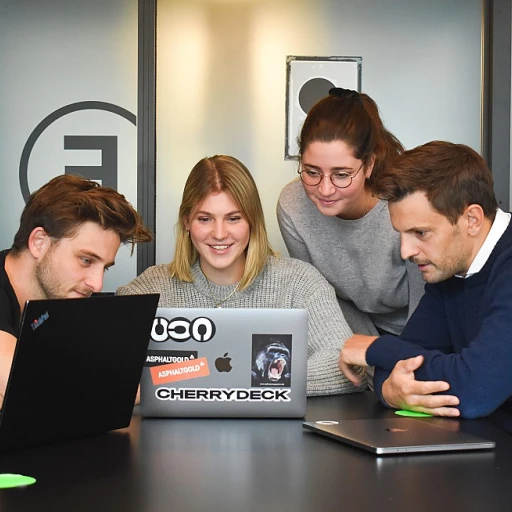
Understanding the Skills Gap
Uncovering the Disconnect in Skills
In today's competitive job market, understanding the skills gap is more essential than ever for both employers and candidates. It's about identifying the disparity between the skills employers need and what job candidates possess. This gap can impede the effectiveness of a team and the overall growth of a company.
To effectively bridge this gap, companies must first assess the needs of their organization and the competencies of their current team members. A systematic approach to identifying skill gaps within your team ensures that the recruitment process is aligned with the company's objectives.
During a job interview, relevant questions can illuminate these gaps by assessing both technical and soft skills, helping identify candidates who can fulfill these needs. Particularly, tailored interview questions allow hiring managers to anticipate how prospective team members might contribute to company culture and adapt to its work life.
By using strategic questions, organizations not only enhance their interview process but also ensure that they are selecting the best talent to address their skills gap. This will help avoid misalignment between what a candidate can offer and the company's requirements, ultimately boosting productivity and team dynamics.
The Role of Interview Questions in Identifying Skills
Crafting Questions to Pinpoint Skills
In the interview process, the questions you ask can make or break your ability to identify a candidate's skills. By carefully crafting your interview questions, you can delve deeper into the capabilities of each candidate, ensuring they are the right fit for the role and your company culture. The right questions will help you uncover both technical and soft skills, which are crucial for any job.
To start, consider what skills are most important for the role. Are you looking for problem-solving abilities, technical expertise, or perhaps a blend of both? Tailoring your questions to these needs will help you assess whether the candidate possesses the necessary skills.
Behavioral and Situational Questions
Behavioral interview questions are a great way to understand how a candidate has handled situations in the past. These questions often start with phrases like "Describe a time when..." or "Share an example of..." and can provide insight into how a candidate will perform in the future. For instance, asking a candidate to describe a time they worked in a team to solve a complex problem can reveal their teamwork and problem-solving skills.
Situational interview questions, on the other hand, are designed to see how a candidate might handle a hypothetical scenario. These questions help gauge a candidate's problem-solving approach and adaptability. For example, "How would you handle a project deadline that is suddenly moved up?" can give you a sense of their time management and prioritization skills.
Assessing Cultural Fit
Beyond technical skills, it's crucial to evaluate whether a candidate will fit into your company culture. Questions that explore a candidate's values and work life preferences can be telling. For example, asking about their preferred work environment or how they handle feedback can help you determine if they will align with your team members and company values.
By integrating these strategies into your interview process, you can make more informed hiring decisions. For further insights on mastering the art of skills gap analysis, consider using a comprehensive template to guide your evaluations.
Top Questions to Assess Technical Skills
Probing Technical Expertise with Key Questions
In today's competitive job market, assessing a candidate's technical skills during an interview is crucial. Technical skills are fundamental for ensuring the candidate can effectively perform the tasks required for the role within your company. Crafting the right interview questions is essential to probe deeper into a candidate’s technical proficiency. To identify the best questions interviewers can ask, focus on inquiries that reveal not just knowledge, but problem-solving capabilities and adaptability. Here’s how you can approach this:- Ask Specific, Role-Based Questions: Tailor questions to the technical requirements of the job. For instance, if a candidate is applying for a software development position, inquire about specific programming languages and tools they have experience with. This will help gauge whether their expertise aligns with the needs of the team.
- Use Situational Interview Questions: These questions help assess how a candidate applies their technical knowledge in real-world scenarios. For example, "Describe a time when you had to troubleshoot a complex technical issue at work." This type of question can reveal how the candidate approaches problem solving and manages time under pressure.
- Incorporate Behavioral Interview Techniques: Questions like "Can you share an example of a project where your technical expertise helped improve team performance?" provide insights into a candidate’s ability to collaborate within team settings and contribute positively to the company culture.
- Explore Continuous Learning Habits: Ask candidates about the resources or strategies they use to stay updated with industry trends. This can help determine if a candidate is committed to growing and maintaining their technical skills over time.
Evaluating Soft Skills Through Conversation
Assessing Soft Skills in Interviews
In the interview process, evaluating a candidate’s soft skills is as crucial as assessing technical abilities. Unlike tangible technical skills, soft skills such as communication, problem-solving, and adaptability may not always be evident from a resume. Yet, they are essential for teamwork and cultural fit within the company. To delve into the evaluation of soft skills, here are some questions interviewers can consider:- Can you describe a time when you had to solve a problem within a team? This question helps in understanding a candidate's problem-solving skills and how they collaborate with team members under pressure.
- How do you prioritize your tasks when deadlines are tight? Assessing how candidates manage their workloads offers insights into their organizational skills and ability to work efficiently under stress.
- Tell me about a time you failed. How did you handle it? By answering this question, candidates will share their resilience and learning experiences, indicating their growth and adaptability over time.
Tailoring Questions to Your Industry
Customizing Interview Questions for Industry Specifics
When it comes to assessing a candidate's skills, tailoring your interview questions to fit the specific needs of your industry is crucial. This approach not only helps in evaluating the technical skills required for the role but also ensures that the candidate is a good cultural fit for your company. Here’s how you can align your questions to your industry’s demands:
- Identify Core Industry Skills: Begin by identifying the key skills that are essential in your industry. For instance, in tech, you might focus on coding languages, while in finance, you may prioritize analytical skills. This will help you frame questions that are relevant to the job.
- Incorporate Real-World Scenarios: Use situational interview questions to understand how candidates will apply their skills in real-world situations. Ask them to describe a time when they solved a specific problem related to your industry.
- Evaluate Cultural Fit: Consider questions that reveal how candidates will integrate with your team. Questions about work-life balance and company culture can provide insights into whether they align with your team members and company values.
- Assess Soft Skills: While technical skills are important, soft skills like communication and teamwork are equally vital. Use behavioral interview questions to gauge how candidates interact with others and handle workplace challenges.
By customizing your interview questions to reflect the unique demands of your industry, you not only streamline the interview process but also enhance your chances of hiring the best candidate for the role. Remember, the goal is to find someone who not only possesses the necessary skills but also fits well within your team and company culture.
Analyzing Responses for Better Hiring Decisions
Gleaning Insights from Candidate Responses
Analyzing the responses from candidates during the interview process is critical for making informed hiring decisions. This section will help you understand how to interpret answers to interview questions effectively, allowing you to discern not only the technical and soft skills of candidates but also their compatibility with your company culture.
When candidates describe a time they successfully solved a problem, listen not only to the solution but also to how it was achieved. This gives you insights into their problem-solving abilities and their capacity for teamwork. Evaluate whether their approach aligns with the work life values your team upholds.
During behavioral interviews, use questions that can reveal how candidates will fit into your team. Their answers should reflect their adaptability, communication skills, and professional demeanor; these are crucial characteristics that contribute to a well-rounded team member. Moreover, analyze whether candidates share values that align with your company's mission and vision.
- Compare the candidate's skills prioritization against your company’s needs.
- Identify any gaps between the candidate's experiences and the role's requirements.
- Assess how effectively candidates articulate their professional experiences and achievements.
Situational interviews can further aid by posing scenarios that are specific to the industry your company operates in. This approach will help you determine whether candidates possess the depth of understanding necessary for the role. Look for answers that show foresight and readiness to tackle industry-specific challenges.
Ultimately, the best candidates will not only fulfill the job requirements but will also demonstrate potential for growth and leadership within your company. By interpreting their responses comprehensively, you underline your commitment to hiring proficient and culturally fitting team members.













